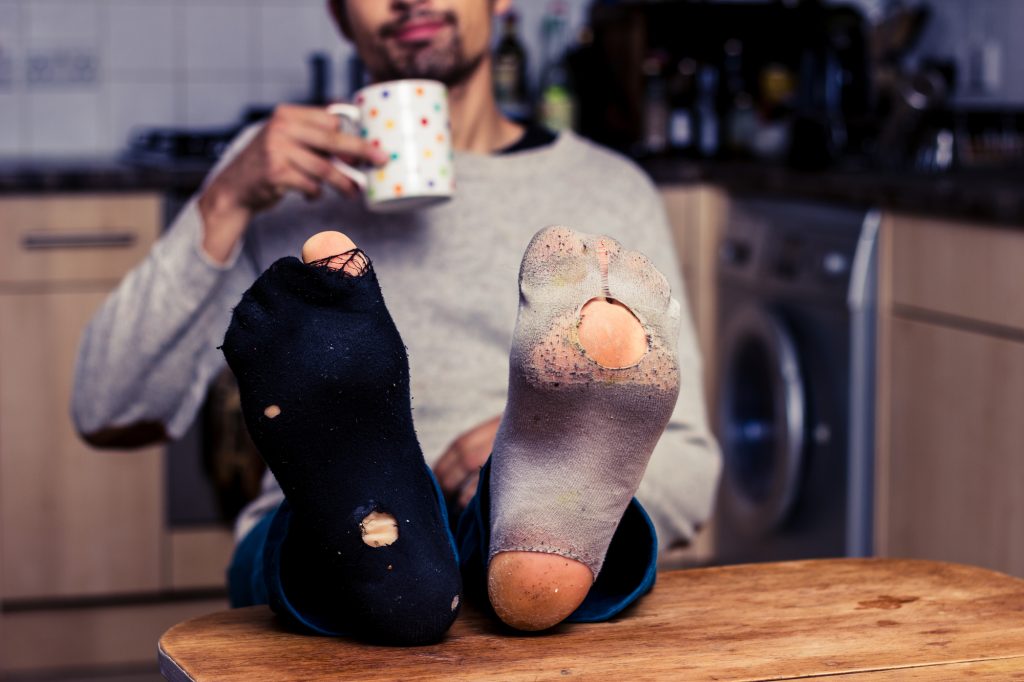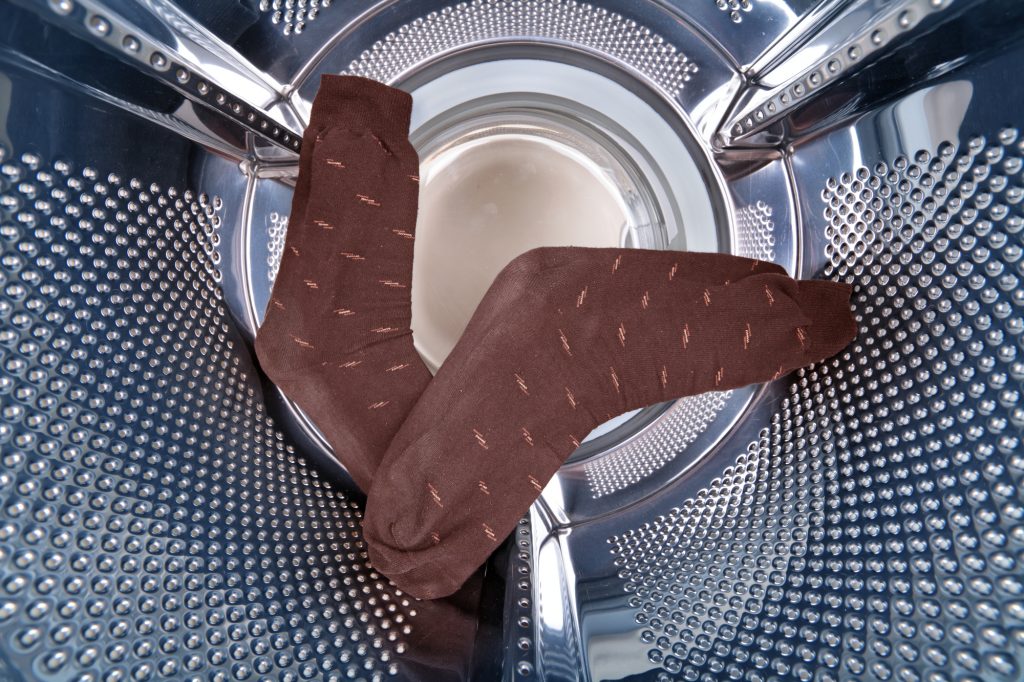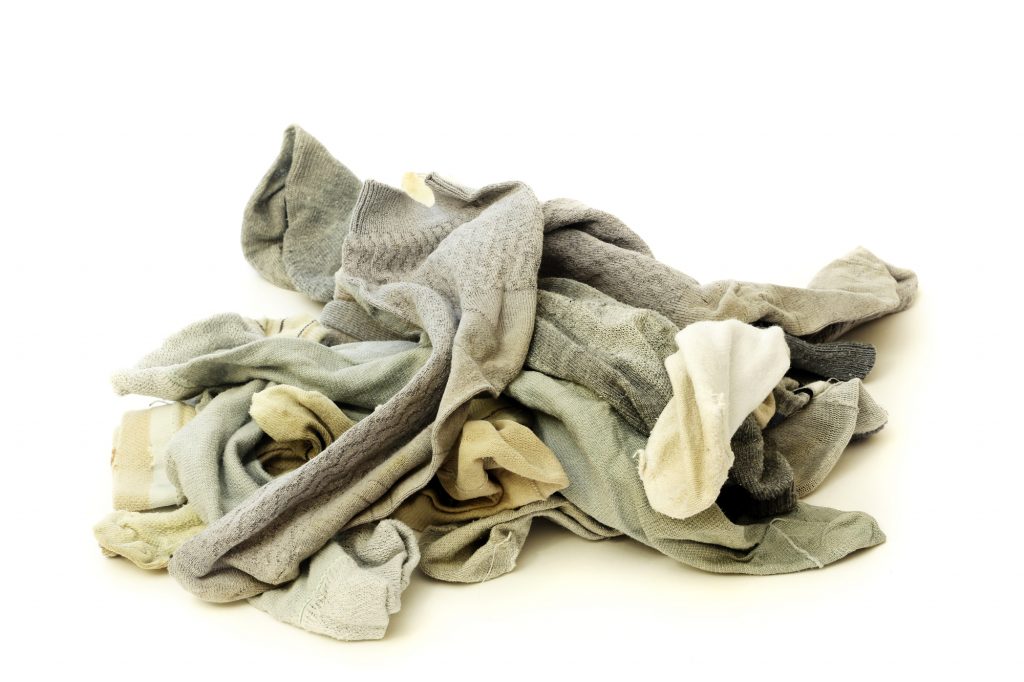This post may contain affiliate links. That means if you click and buy from that link, I may receive a small commission (at zero cost to you), which helps me maintain the quality of this blog. Please see my full disclosure policy for details.
How long should socks last? That’s a question that many men ask themselves when they notice their old sock is getting thin. But, unfortunately, whether you’re just starting to get holes in your socks or if you’ve been wearing them for years, it can be hard to know when the time comes to replace them.
The answer will vary depending on how much you wear your socks and what type of material they are made out of. There are actually many factors that go into determining how long your socks will last.
Let’s find out how long socks should last and what you can make for them to last longer.
How Long Should Socks Last?
It’s a difficult question to answer, but I would say socks should last between three to six months in general if you wear them two or three times per week. Every type of sock has a specific number of wears or washes before it starts to wear out.
The lifespan of your socks depends on how you wear them, where you wear them and how you wash them.
What Affect The Socks Life?
There are a few factors that can influence how long your socks will last. For me, these are the most relevant.
The Material
Not all socks are made out of the same material. Some are even made from several materials that combine into a better sock. Cotton and polyester are the most common sock materials. Let’s give you some examples.
Most Durable Sock Materials – Combed Cotton, Bamboo. Nylon, Polyamide, Merino Wool, Polyester, Polypropylene, Spandex.
Combed cotton is more durable than standard cotton. They are highly durable for everyday use, and you can get them in both thick and thin variations.
Read: Best Socks For Sweaty Feet
Bamboo socks are very breathable, and they’re made from a natural fabric. They have good wicking properties that help keep your feet dry, and it’s not too hard to wash them.
I have to say I am a big fan of merino wool socks since this material regulates the temperature of your feet. It keeps your feet warm or cool depending if it is warm or cold weather. Pretty cool, right? It’s also antibacterial and absorbs and wicks moisture

Less Durable Sock Materials – Common Cotton, Cashmere, Wool, and Acrylic.
Cotton is probably the most common material for socks. Many men wear cotton socks because they are cheap and come in saving packs (most would not even know what the fabric of their socks is. I was one of them in the past). However, cotton is not a durable material, and it will break down faster than synthetic socks like polyester or polyamide.
The same goes for wool, but it depends on what you use them. They are acceptable to sleep, but not to walk around every day. Cashmere is known for being soft, not durable.
The Activity
Some socks are designed for specific activities like running, hiking, biking, or walking. They are made from materials that fit each activity, and they have special features designed for the best performance when you’re in that specific activity.
Running socks have more padding and are made of materials that can absorb the impact on them every time you place your foot on the floor. They are also more resistant to the friction between the sock and the shoe than average socks.
Hiking socks are made of materials that can dry fast, which is necessary for outdoor activities in different weather conditions. It will help to keep your feet warm and dry all day long.
Wearing cashmere socks every day will make them much less durable than cotton socks. However, cotton socks last less than polyester socks. But if you wear cashmere socks every day at night at home with slippers, they will last long.
Read: How To Wear No Show Socks?
If you wear socks around the house on a rough floor or a carpet, their lifespan will be short. As you can see, your lifestyle and your activities can dictate how long socks last.
The Washing
Delicate materials such as cashmere, merino wool, and silk socks should be hand-wash when possible, or you will be replacing these socks more often than you should.
When you put delicate socks on the washing machine, they rub against other abrasive pieces. This can cause ripping or tearing.

The same goes for other materials, but since they are stronger than these three, they often are ok on the washing machine (unless you wash them like three or four times per week).
The Number Of Times You Wear It
It’s only logical that the more you use a sock, the faster it will wear. You can’t expect a sock made from a cheap material to last as long as one made of high-quality material designed for a specific activity.
The Fit
If the sock is too big or too small, this can also affect its lifespan. If your socks are too small, your feet will push against the fabric, tearing it over time, creating those holes you see all the time (I know I see them often).
If the socks are too big, they will move around your foot, folding and bunching up, affecting its durability.
How To Make Socks Last Longer?
These are some tips you can follow to make your socks last longer.
Buy Quality Socks
You get what you pay, and that’s so true for fashion items (ok, sometimes you are paying for the logo, but not when it comes to socks). High-quality socks are made with more durable materials and have reinforced seams so they can last longer.
Choose The Right Socks For The Right Activities
It seems a basic rule, but many guys choose the first pair of socks they can find and don’t worry about what activity they will do.
Read: How To Keep No Show Socks From Slipping?
If you do an activity that involves a lot of friction between your shoe and socks, go for high-quality socks with unique features to avoid them being worn out too fast. For example, if you go for a run, wear running socks, if you wear boots at work, choose working socks, etc.
Wash Them Cold
Washing any of your socks in hot water can damage them since it can shrink certain types of fabrics (cotton, wool, and linen) and cause the bright colors to fade. When it comes to synthetic materials (polyester, vinyl, or nylon), hot water can break down the fibers and ruin the fabric.
The best option seems to be washing your socks with cold water since it is less likely to shrink or fade the color of the socks.
When washing your socks (or any other clothing items), try not to use any harsh chemicals or bleach since it will hurt the fabric, developing holes much quicker.
Air Dry Naturally
It’s always best for your socks (and again, any other clothing item) to air dry completely and avoid using a machine or, worse, a hairdryer (I did see this once).
If you want to use a machine, put them in the delicate cycle and don’t use any fabric softener or dryer sheets. But don’t do it often because of the damage it can cause.
Keep Your Toenails Clipped
This is another tip that sounds pretty obvious, but people don’t really think about it. When you don’t clip your toenails, they can damage the fabric and cause holes. It’s even worse for people than when walk puts a lot of pressure on that shoe region. So not only will your socks have a hole, but also your shoes.
When Should You Throw Out Old Socks?
Some people wear their old socks till the last moment possible. “Only four holes, no fabric left, and no cushioning? They might last another couple of weeks”. No, you need to stop. You need to take care of your feet and offer good socks to protect them and prevent some serious injuries (I know they are only socks, but they are another layer of protection).

You need to throw your socks into the bin or wear them for something else when:
- they have holes
- they have been repaired countless times
- the elastic is stretched
- they don’t have any cushioning
- the fabric has worn out
- the color is faded
Also, if you feel any pain on your feet when wearing some socks, it might be because they are very worn out and you need a new pair. Blisters are often a sign of shoes that rub your ankle but can also be because your socks no longer offer any layer of protection.
Read: How Many Pairs Of Socks Should A Man Own?
If you don’t want to throw your socks into the bin, you can use them for dusting, painting, or bottle sleeves. Use your imagination.
Common Questions About How Long Should Socks Last
These are the most common questions about how long should socks last.
How Long Do Running Socks Last?
It depends on how many times a week you run and how long you do it. Running socks lose padding, support, and cushioning every time you wear them. I usually change my running socks every 200 to 300 miles, depending on the state of them.
How Long Should Compressions Socks Last?
I would change any compression socks when you feel they don’t offer the same tight-fitting when you purchased them. For some people, that can be after three months, but for others, after nine. My advice is to keep a fresh pair that you don’t wear and check if the old pair offers the same elasticity.
Can Socks Last Forever?
If you never wear the socks, they can last forever. If you wear them like once every three months, they will last you for many years. So you can expect a pair of socks to last around three months to one year, depending on all the mentioned factors.
How Do You Get Rid Of Old Socks?
The best thing you can do with your old socks if you don’t want to reuse them for other activities at home is to recycle them.
Conclusion About How Long Should A Pair Of Socks Last
How long should socks last? Unfortunately, it’s not easy to know how long socks will last. This is because so many factors affect the life of a sock, including the material it is made out of, your activity level and frequency you wear them, fit on your feet, the number of times washed in hot water or machine dried.
Socks are a pretty simple piece of clothing. They’re not meant to be complicated! But there are still some things you should know, like what affects their lifespan so that you can get the most out of your socks when you buy them.
If you find yourself with an old pair (or two) lying around after they have lost their elasticity and become too stretched-out at the heel for comfort, then some clear signs say it’s time to throw them away. The best way to make sure all those new pairs stay fresh as longer? Give some thought about what activities they’re designed for before buying any more.
How long do your socks last? Share with me in the comments.
